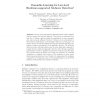Free Online Productivity Tools
i2Speak
i2Symbol
i2OCR
iTex2Img
iWeb2Print
iWeb2Shot
i2Type
iPdf2Split
iPdf2Merge
i2Bopomofo
i2Arabic
i2Style
i2Image
i2PDF
iLatex2Rtf
Sci2ools
RAID
2015
Springer
2015
Springer
Ensemble Learning for Low-Level Hardware-Supported Malware Detection
Recent work demonstrated hardware-based online malware detection using only low-level features. This detector is envisioned as a first line of defense that prioritizes the application of more expensive and more accurate software detectors. Critical to such a framework is the detection performance of the hardware detector. In this paper, we explore the use of both specialized detectors and ensemble learning techniques to improve performance of the hardware detector. The proposed detectors reduce the false positive rate by more than half compared to a single detector, while increasing the detection rate. We also contribute approximate metrics to quantify the detection overhead, and show that the proposed detectors achieve more than 11x reduction in overhead
| Added | 17 Apr 2016 |
| Updated | 17 Apr 2016 |
| Type | Journal |
| Year | 2015 |
| Where | RAID |
| Authors | Khaled N. Khasawneh, Meltem Ozsoy, Caleb Donovick, Nael B. Abu-Ghazaleh, Dmitry V. Ponomarev |
Comments (0)

